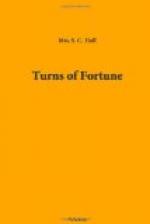“It has lain two days, Measter Lynne,” said the man, “for you never send but once a-week; only, as I thought by the seal it must be something grand, whoy I brought it down myself.”
It was from Helen!—from the ambitious cousin—a few sad, mournful lines, every one of which seemed dictated by a breaking heart.
She was ill and wretched, and the physician had suggested change of air; but above all her native air. Would Rose receive her for a little time, just to try what its effect might be?—she was sure she would, and she would be with her immediately.
“Strange,” said Edward, “how nature will assert and keep its power; when luxury, art, skill, knowledge, fail to restore health, they tell you of native air, trusting to the simple, pure restorative, which is the peasant’s birthright, as infallible. I wonder, Rose, how those fine people like to be thrown back upon the nature they so outrage.”
“Poor Helen!” exclaimed Rose, “how dispirited she seems—how melancholy! I ought to feel afraid of your meeting her, I suppose, Edward; but I do not—you have grown satisfied with your poor Rose. We shall be able to make her very comfortable, shall we not?”—and then she smiled at the homeliness of the phrase, and wondered what Helen would say if she heard her.
It was not without sundry heartbeatings that Rose heard the carriage stop, and assisted Helen to alight; nor could she conceal her astonishment at the ravages which not past years but past emotions had wrought on her once beautiful face.
The habit of suppressing thoughts, feelings, and emotions, had altogether destroyed the frank expression of her exquisitely chiselled mouth, which, when it smiled now, smiled alone; for the eyes, so finely formed, so exquisitely fringed, did not smile in unison; they had acquired a piercing and searching expression, altogether different from their former brilliancy.
The elevated manners, the polished tone which high society alone bestows, only increased the distance between the two cousins, though Rose was certainly gratified by the exclamation of pleasure which told how much better than she anticipated were the accommodations prepared by her humble relative.
“Such pretty rooms—such beautiful flowers! Rose, you must have grown rich, and without growing unhappy. Strange, you look ten years younger than I do!”
“Late hours, public life, and anxieties,” said Rose.
“Yes, that last appointment his lordship obtained, the very thing above all others I so desired for him, has completely divided him from his home. We hardly ever meet now, except at what I may call our own public dinners.”
“And he, who used to be so affectionate, so fond of domestic life!” involuntarily exclaimed Rose.
“And is so still; but the usages of society, the intrigues and bustle of public business, quite overthrow every thing of that kind. Oh, it is a weary, wearying world!”




